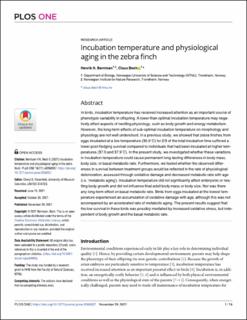Incubation temperature and physiological aging in the zebra finch
Peer reviewed, Journal article
Published version

Åpne
Permanent lenke
https://hdl.handle.net/11250/2979580Utgivelsesdato
2021Metadata
Vis full innførselSamlinger
- Institutt for biologi [2575]
- Publikasjoner fra CRIStin - NTNU [38127]
Originalversjon
10.1371/journal.pone.0260037Sammendrag
In birds, incubation temperature has received increased attention as an important source of phenotypic variability in offspring. A lower than optimal incubation temperature may negatively affect aspects of nestling physiology, such as body growth and energy metabolism. However, the long-term effects of sub-optimal incubation temperature on morphology and physiology are not well understood. In a previous study, we showed that zebra finches from eggs incubated at a low temperature (35.9˚C) for 2/3 of the total incubation time suffered a lower post-fledging survival compared to individuals that had been incubated at higher temperatures (37.0 and 37.9˚C). In the present study, we investigated whether these variations in incubation temperature could cause permanent long-lasting differences in body mass, body size, or basal metabolic rate. Furthermore, we tested whether the observed differences in survival between treatment groups would be reflected in the rate of physiological deterioration, assessed through oxidative damage and decreased metabolic rate with age (i.e. ‘metabolic aging’). Incubation temperature did not significantly affect embryonic or nestling body growth and did not influence final adult body mass or body size. Nor was there any long-term effect on basal metabolic rate. Birds from eggs incubated at the lowest temperature experienced an accumulation of oxidative damage with age, although this was not accompanied by an accelerated rate of metabolic aging. The present results suggest that the low survival in these birds was possibly mediated by increased oxidative stress, but independent of body growth and the basal metabolic rate.